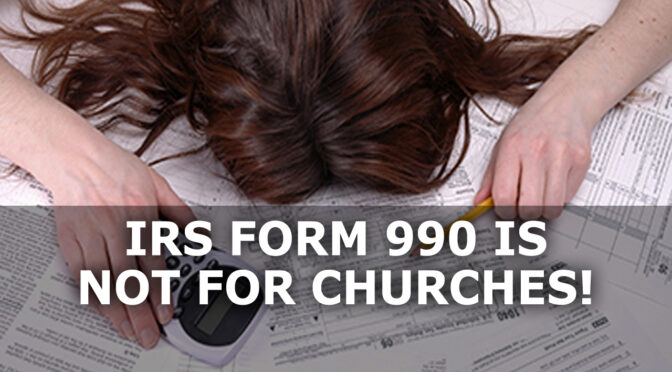Sometimes an accountant — or even an IRS employee — will misinform a church employee or church member, falsely claiming that the church supposedly must file a troublesome document called IRS Form 990.
Such accountants are simply mistaken. Put simply, they are wrong. (We once even had an IRS employee tell us wrongly about this matter.)
How can we say so with such authority? Because official IRS statements back us up on the matter.
According to IRS documentation (here: https://www.irs.gov/pub/irs-pdf/i990.pdf) churches don’t ever need to file Form 990.
The question of whether to file can seem confusing, because at first the document sounds like the answer is based solely on how much revenue a non-profit entity gets in a year, and its overall holdings in a year, but those criteria don’t even apply whenever the entity is listed among those that are completely exempted from filing Form 990.
To verify what we’re saying here — to confirm that your church does not need to file Form 990, just click the above link to access the IRS documentation in PDF format. Then scroll to page 3, and look at Section B, which is quite unambiguously titled “B. Organizations Not Required To File Form 990 or 990-EZ.” There you will see that a church or church-related or religious type group does not have to file form 990.
Being that is the case, why is there all the earlier wording, explaining that a non-profit organization is exempted from filing only if certain conditions are met? It’s simple: that other wording applies to non-profit entities other than the exempted ones, such as a Food Pantry that has its own EIN (tax number).
Why would a Food Pantry operated under a church need or want its own EIN? Because of external donors potentially having their own privately-established rule that they won’t donate to an entity or ministry unless it has its own EIN, separate from a host church’s EIN—which is the case for our Food Pantry ministry. Each year, a private individual makes a sizable donation to our Food Pantry ministry, and their employer matches their charitable giving. However, that employer has its own policy in place requiring the ministry receiving the matching funds to have its own EIN and be listed in a federally maintained list of non-profits.
Our Food Pantry ministry (which has its own EIN) does not have to file Form 990 because it has less than $200,000 received in a year, and is not ever worth more than $500,000 at the end of the tax year. Instead of filing the tedious Form 990, our Food Pantry files a very short, very easy “e-postcard” version, which allows the ministry entity to keep its own EIN, even though it does not file the full Form 990.
Recently, one of our churches that operated a TNT fireworks tent as a fundraiser last year, was misinformed by their accountant, who said that because their overall revenue (note: not proceeds after paying for fireworks product, but all incoming revenue) put them over an arbitrary line, they supposedly had to file Form 990. The accountant is wrong. Because the entity in focus is a church, it does not matter how much revenue is received in a year’s time, the church still is not required by the IRS to file a Form 990.
Note: This article is not intended to serve as a replacement for tax advice by a professional, nor as legal advice. It is written by a pastor and presbyter, citing a clearly stated policy of the IRS. The weight of the statements here is simply the strength and clarity of the IRS statements in the service’s own documentation, linked above.

